Emotional Torture
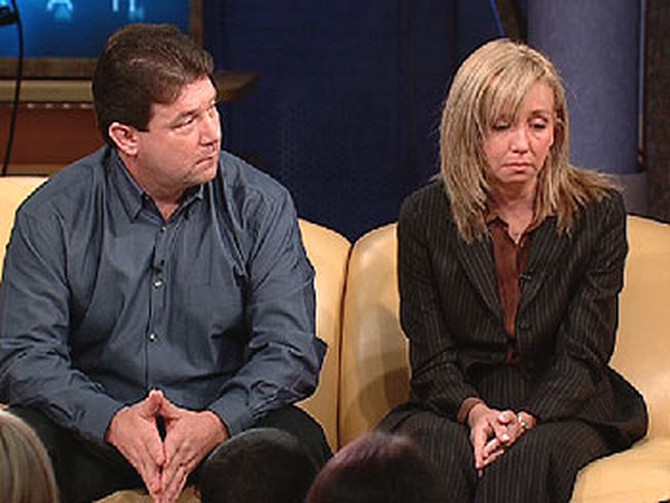
Kim and Eddie have been married for five years and have two young boys. They admit they need help. The name-calling, the degrading insults—Kim has hidden the emotional anguish she says Eddie puts her through on a daily basis. Kim says she has often wished it would get so bad that Eddie would turn physically violent—so she'd have "a reason to get out." How does she feel about herself?
"I feel like the ugliest, most stupid person," Kim says. "I feel like the worst mother in the world. I feel like I don't deserve my children. I don't feel like I'm worthy of love by anybody."
"I feel like the ugliest, most stupid person," Kim says. "I feel like the worst mother in the world. I feel like I don't deserve my children. I don't feel like I'm worthy of love by anybody."

Kim says she had been in previous abusive relationships, so when Eddie came along, she thought he would keep her safe.
"When I met him, I was happy," Kim says. "I got a good job. I worked for two years and then everything went downhill after I miscarried. I think I felt like a failure."
Eddie says that he did not believe that Kim was happy when she met him, and that she's always had self-esteem issues.
"When I met him, I was happy," Kim says. "I got a good job. I worked for two years and then everything went downhill after I miscarried. I think I felt like a failure."
Eddie says that he did not believe that Kim was happy when she met him, and that she's always had self-esteem issues.
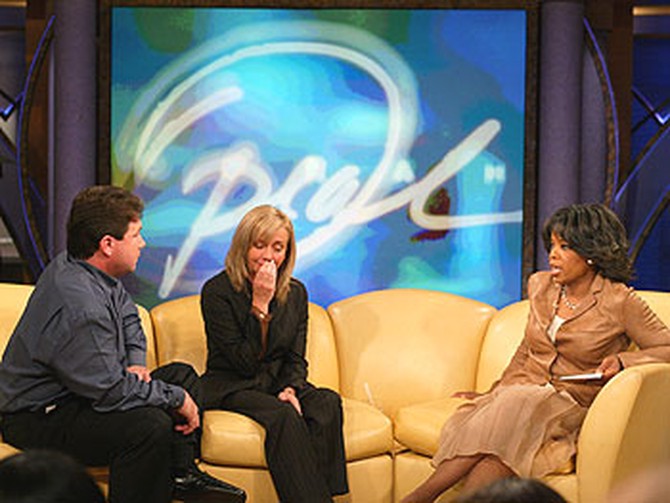
We put cameras inside Kim and Eddie's home. After watching the videotape of how he acted toward Kim, Eddie was nearly brought to tears. He had no idea his words were that devastating or that his wife was in so much pain.
"I love you, Kim," Eddie says. "I'm sorry for hurting you and breaking your heart time and time again. I honestly didn't realize. Thank you for pointing it out to me."
Kim says she's leaving the show not completely convinced Eddie will change. "I want him to take me seriously that I won't put up with it anymore," Kim says. "If I see on the plane ride home or in the hotel that he's the same way, then I don't know how it can be fixed."
"I love you, Kim," Eddie says. "I'm sorry for hurting you and breaking your heart time and time again. I honestly didn't realize. Thank you for pointing it out to me."
Kim says she's leaving the show not completely convinced Eddie will change. "I want him to take me seriously that I won't put up with it anymore," Kim says. "If I see on the plane ride home or in the hotel that he's the same way, then I don't know how it can be fixed."

Dr. Susan Weitzman is a psychotherapist who specializes in emotional abuse and the author of Not to People Like Us: Hidden Abuse in Upscale Marriages. She says that emotional behavior like Kim's and Eddie's is often kept a secret because the two usually have a "silent agreement" about the abuse.
"First, [the woman] buys into what the guy is saying," Dr. Weitzman says. "She buys into [the emotional abuse], and it's like a systematic erosion of self-esteem. He says she's bad, and she says, 'I guess I am.' Ironically, that bonds them in some crazy kind of way. They both agree that it's her fault. There's the feeling of being ashamed and embarrassed, or maybe she's hooked on hope, as I call it. She's hoping he'll change so if she doesn't talk about it, maybe it will go away."
"First, [the woman] buys into what the guy is saying," Dr. Weitzman says. "She buys into [the emotional abuse], and it's like a systematic erosion of self-esteem. He says she's bad, and she says, 'I guess I am.' Ironically, that bonds them in some crazy kind of way. They both agree that it's her fault. There's the feeling of being ashamed and embarrassed, or maybe she's hooked on hope, as I call it. She's hoping he'll change so if she doesn't talk about it, maybe it will go away."
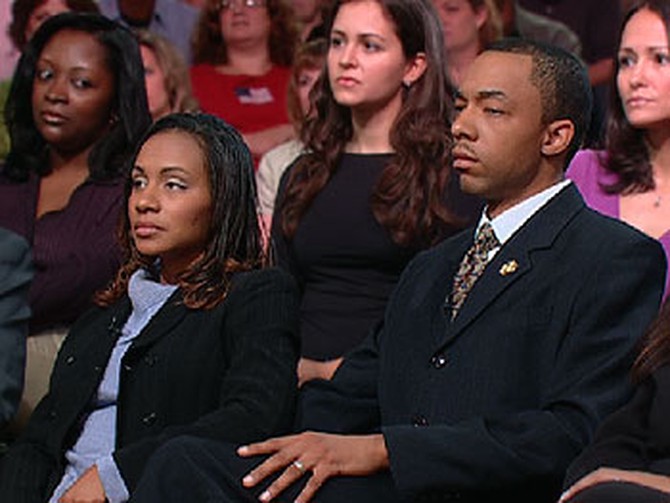
Chris began emotionally torturing his wife Loretta shortly after they got married two years ago, screaming names at her, such as "bitch", "slut" and "whore". He says he wouldn't stop until he made her cry.
Oprah: What else would you do?
Chris: Everything that you can possibly think of, with the exception of hitting her. To an extent I think it would have been better if I had hit her… because she would have gotten over the bruises from that a lot quicker than from my actual words…I would not stop. She left the room, I followed. I would not stop until she cried.
Oprah: And the first time you're called [profane names], you felt what?
Loretta: Well, at first it was anger, you know? Because I wasn't used to something like that. I lashed back out…I started yelling at him. But as it went on—you just start taking it and sitting there and you become more and more [beaten down].
Oprah: What else would you do?
Chris: Everything that you can possibly think of, with the exception of hitting her. To an extent I think it would have been better if I had hit her… because she would have gotten over the bruises from that a lot quicker than from my actual words…I would not stop. She left the room, I followed. I would not stop until she cried.
Oprah: And the first time you're called [profane names], you felt what?
Loretta: Well, at first it was anger, you know? Because I wasn't used to something like that. I lashed back out…I started yelling at him. But as it went on—you just start taking it and sitting there and you become more and more [beaten down].

Chris, who used to yell, scream and emotionally torture his wife Loretta, says he sought professional help after his wife packed up her things, took their son and left. The 14-week, court-ordered "compassion and power" workshop helped Chris to see the implications of his rage.
"After about the third or fourth week, something clicked; snapped," he says. "And I started to see myself and the pain that I was causing her or the pain that she was feeling. I started to feel that within myself. And that allowed me to start to change."
"After about the third or fourth week, something clicked; snapped," he says. "And I started to see myself and the pain that I was causing her or the pain that she was feeling. I started to feel that within myself. And that allowed me to start to change."
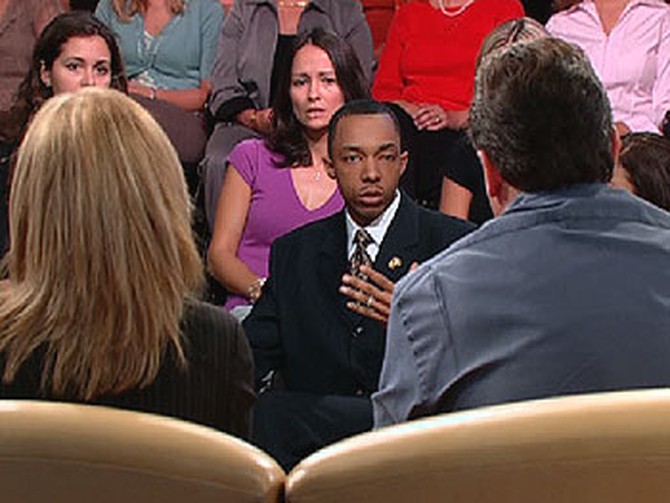
Chris says he sees himself in Eddie, and applauds him for coming to the show and admitting his faults. "You know there's a problem," Chris says to Eddie. "And if you love her, you'll change. When the heart speaks, you have no choice but to listen. And if your heart is truly for her, you cannot resist. When you see that you have a problem, if you really want your marriage to last and you want your family to work, just accept it and move through it."
Kim says she doesn't believe that Eddie will change, and that she wants him to take her seriously.
"At certain times…I believed that [my wife] would leave me, but the more she said she would and didn't, it didn't become real until she did," Chris tells Kim. "If you want him to take you seriously, you have to take yourself seriously first. And then he will."
Kim says she doesn't believe that Eddie will change, and that she wants him to take her seriously.
"At certain times…I believed that [my wife] would leave me, but the more she said she would and didn't, it didn't become real until she did," Chris tells Kim. "If you want him to take you seriously, you have to take yourself seriously first. And then he will."
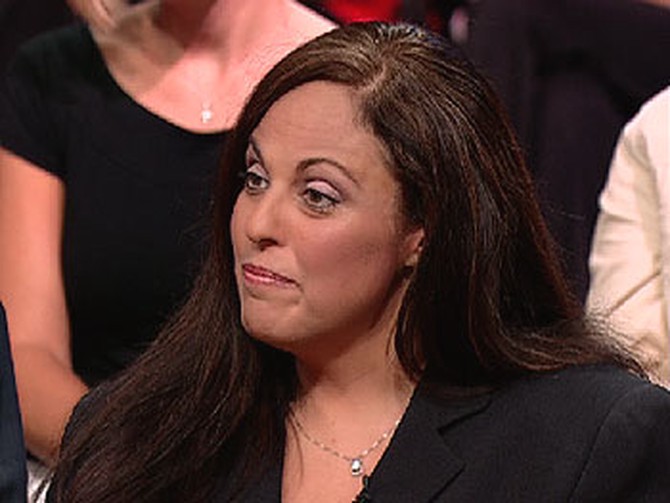
Dr. Weitzman says constant emotional abuse can cause a woman to begin questioning her own feelings.
"A lot of the men will say, 'Oh, toughen up. Get a thicker skin. You're being too sensitive,'" Dr. Weitzman says. "And again they'll turn it on the woman and she'll say, 'Maybe, am I being too sensitive? Maybe it is my fault.' And that is part of the erosion of her self-esteem…. In other words, now she's doubting her own reality. Her own perceptions are up for grabs and she starts using him as her reality check.
"What's interesting is that the biggest predictor of what [type of] man will change is if there are consequences," Dr. Weitzman says. "If you don't give him any consequences, you really—not to blame you—you're helping to perpetuate it."
"A lot of the men will say, 'Oh, toughen up. Get a thicker skin. You're being too sensitive,'" Dr. Weitzman says. "And again they'll turn it on the woman and she'll say, 'Maybe, am I being too sensitive? Maybe it is my fault.' And that is part of the erosion of her self-esteem…. In other words, now she's doubting her own reality. Her own perceptions are up for grabs and she starts using him as her reality check.
"What's interesting is that the biggest predictor of what [type of] man will change is if there are consequences," Dr. Weitzman says. "If you don't give him any consequences, you really—not to blame you—you're helping to perpetuate it."
Published 10/05/2004

